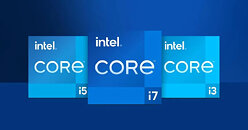Monday, March 8th 2021

Intel Plans a Sizable 11th Gen Core "Tiger Lake-H" Mobile Processor Lineup
Intel's new 8-core "Tiger Lake" silicon will play a major role in holding the company's dominance in the mobile processor space, with plans for new 6-core and 8-core SKUs being in motion. OneRaichu on Twitter, a reliable source with Intel leaks, points to several unreleased model numbers. The 8-core "Tiger Lake-H" die is expected to be built on the same 10 nm SuperFin process as the "Tiger Lake-U" silicon. The lineup is led by the Core i9-11980HK, an 8-core/16-thread processor that uses eight "Willow Cove" CPU cores, 2.60 GHz nominal- and 5.00 GHz max-Turbo frequency, and 3.30 GHz AVX512 frequency. This chip will be in a class of its own, as its TDP is rated at 65 W, significantly above the 35-45 W TDP range that constitutes the H-segment. It will likely power large gaming notebooks with elaborate cooling solutions. It will also come with an unlocked base-clock multiplier.
The Core i9-11900H is the next chip in the lineup, with slightly lower clock speeds of 2.50 GHz base, 4.90 GHz max-Turbo, and 2.10 GHz AVX512. This chip features a much lower 35 W TDP, and will come with aggressive power management compared to the i9-11980HK. The Core i7-11800H will be the slowest 8-core part, with clock speeds of 2.40 GHz nominal, 4.60 GHz max-Turbo, and 2.00 GHz AVX512. It comes with the same 35 W TDP as the i9-11900H. Next up, are 6-core/12-thread parts, likely under the Core i5 brand. These include the i5-11400H, clocked at 2.70 GHz nominal, 4.50 GHz max-Turbo, and 2.20 GHz AVX512. At the bottom of the pile is the i5-11260H, clocked at 2.60 GHz, with 4.40 GHz max-Turbo, and 2.10 GHz AVX512. Both Core i5 parts are 35-Watt.
Sources:
OneRaichu (Twitter), via VideoCardz
The Core i9-11900H is the next chip in the lineup, with slightly lower clock speeds of 2.50 GHz base, 4.90 GHz max-Turbo, and 2.10 GHz AVX512. This chip features a much lower 35 W TDP, and will come with aggressive power management compared to the i9-11980HK. The Core i7-11800H will be the slowest 8-core part, with clock speeds of 2.40 GHz nominal, 4.60 GHz max-Turbo, and 2.00 GHz AVX512. It comes with the same 35 W TDP as the i9-11900H. Next up, are 6-core/12-thread parts, likely under the Core i5 brand. These include the i5-11400H, clocked at 2.70 GHz nominal, 4.50 GHz max-Turbo, and 2.20 GHz AVX512. At the bottom of the pile is the i5-11260H, clocked at 2.60 GHz, with 4.40 GHz max-Turbo, and 2.10 GHz AVX512. Both Core i5 parts are 35-Watt.

14 Comments on Intel Plans a Sizable 11th Gen Core "Tiger Lake-H" Mobile Processor Lineup
Good job, OEMs.
www.notebookcheck.net/Polish-source-claims-Nvidia-and-Intel-worked-together-to-block-the-marketing-of-premium-AMD-Ryzen-4000-laptops-with-high-end-GPUs-in-2020.515615.0.html
Is intel changing their TDP ratings for the 11th gen?
A detachable tower cooler would help...
But yeah. We can't say its impossible some turbo trickery is involved.
I'd say that intel stating that the 11980HK is a 65W cpu is a good thing. If anything, it will prevent these parts from going into thin and light premium laptops, which is frankly ridiculous and a waste of money if you ask me